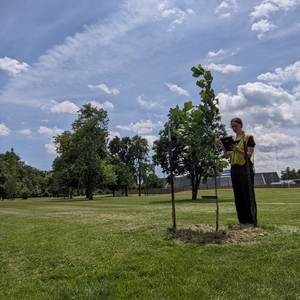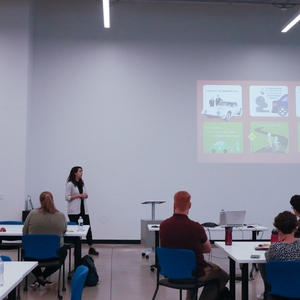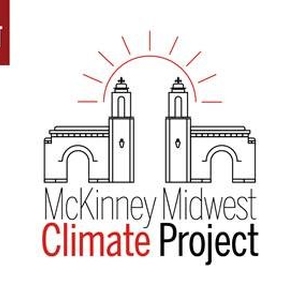Resilience Cohort, Indiana University Environmental Resilience Institute
Indiana University Bloomington
Project Overview
The Resilience Cohort (RC) is a program of the Environmental Resilience Institute (ERI) at Indiana University (IU) that helps Indiana city, town, and county governments to measure and reduce local greenhouse gas emissions and implement climate resilience strategies. The Resilience Cohort has at its foundation the three pillars of IU 2030: The Indiana University Strategic Plan: Student Success and Opportunity; Transformative Research and Creativity; Service to Our State and Beyond.
Participating local governments join a cohort of peers to achieve a shared goal, following a highly facilitated technical assistance curriculum. Each community receives one-on-one guidance, equity coaching, group training webinars, GIS support, and translation services. The program also builds the capacity and knowledge of partner communities by embedding a McKinney Climate Fellow (MCF) in each participating local government. A clear framework of timelines, milestones, and deliverables, along with intensive technical assistance and dedicated student support, allow local government staff to accomplish significant goals in a short period of time, for a fraction of the cost of a consultant.
MCFs receive invaluable work experience and exposure to a fulfilling career pathway that retains them in Indiana. Fellow recruitment reflects the multi-dimensional nature of the sustainability challenge – fellows come from across the spectrum of IU academic programs and schools, as well as from regional IU campuses, and includes international students and students of color.
The Resilience Cohort program has many positive impacts: it creates a pipeline of trained sustainability professionals for Indiana’s public service workforce; it increases local governments’ capacity to complete sustainability work across Indiana; and it normalizes sustainability and climate action work across varying political backgrounds, community size, and population demographics.
Background
Indiana faces myriad sustainability challenges. By mid-century, Indiana is expected to experience a 5-6° F increase in average temperature and more frequent extreme rainfall events leading to increased heat-related illness, spread of disease-carrying insects, and stress to fresh water supply (Indiana Climate Change Impacts Assessment 2018). Due in large part to an industry-heavy economy, addressing greenhouse gas emissions is critical in Indiana, where the state ranks 5th in CO2 emitted per capita and 6th in total energy-related CO2 emissions (Energy Information Administration, 2016 data). These challenges already impact the residents of Indiana, whose home state ranks 49th in pollution and its related public health risks.
Planning for climate change involves both mitigation and adaptation. The first addresses the cause of global climate change—greenhouse gas (GHG) emissions from the burning of fossil fuels. This requires assessing or measuring GHG emissions, planning reduction strategies, and implementing those strategies. Adaptation prepares for the climate change impacts that are unavoidable, many of which Hoosier communities are already feeling. This requires assessing vulnerabilities to climate impacts, planning strategies to build resilience to those impacts, and implementing these strategies. The Resilience Cohort meets these needs with topics that fall into “assess”, “plan” or “implement” project types – example “implement” topics are becoming a solar-ready community, creating a tree planting plan, or developing an electric vehicle encouragement program.
At the time of ERI’s founding, only three Indiana local governments had dedicated sustainability staff. Those staff reported severe limitations on financial resources, time, and access to technical expertise and noted that many of the available resources and success stories were from coastal or large urban communities. Hoosiers working in the environmental field also noted a lack of awareness and support for sustainability efforts at both community and policy levels and craved a stronger network and more intentional collaboration and convening to build on the momentum developing independently in these three cities. As ERI developed its mission of helping Indiana prepare for environmental change statewide, it identified local government support as a key gap that IU’s faculty, staff, and students could help fill.
While ERI was establishing its local government technical assistance programs, the IU Sustainability Office (Sustain IU) was establishing a student externship program. The nascent Resilience Cohort created an externship placement with each participating local government. Students are supported financially through scholarships. Leveraging IU students to provide additional capacity, alongside the expertise and support provided by ERI, helped accelerate local government climate action.
The program is generously supported by the McKinney Family Foundation and other funders, as well as by different partnership organizations across Indiana that host student fellows and benefit from the program. Summer 2023 is the program’s fifth year.
References:
1. Indiana Climate Change Impacts Assessment report released in March 2018. For more information, visit https://ag.purdue.edu/indianaclimate/indiana-climate-report/ US News & World Report. (n.d.).
2. These States Have the Least Amount of Pollution. Retrieved May 9, 2023, from https://www.usnews.com/news/best-states/rankings/natural-environment/pollution.
Goals
The Resilience Cohort connects local governments with the tools, training, and expertise to assess, plan, and implement climate action within their jurisdictions. The primary goal is to accelerate climate action in Indiana. The core objectives are to:
-
Expand communities’ sustainability staff capacity through subsidized, full-time student support over the summer and extensions into the academic year.
-
Provide employment and professional development opportunities to IU students.
-
Develop a skilled climate and sustainability workforce and retain talent in Indiana and the Midwest by demonstrating the value of public service sustainability careers.
-
Expand local government staff knowledge in sustainability, climate action, environmental justice, and community-based problem-solving.
Implementation
The Resilience Cohort program was initially developed in consultation from local government sustainability staff and internal IU partners. The first cohort was a pilot project in 2019 working with 14 local governments to complete a GHG inventory, with ICLEI as the technical expert, providing the curriculum and training to guide the cohort’s work. After the success of the pilot, participants requested continued support from ERI and capacity from Fellows, with many stating a desire to create a climate action plan based on the inventories completed.
The Resilience Cohort now runs on an annual cycle. The Resilience Cohort is directed by the Assistant Director of Policy and Implementation, managed by the Resilience Programs Coordinator, and supported by student interns. Consultants under contract to ERI provide technical assistance, equity coaching, and translation services.
The phases of the annual program cycle are as follows:
Design and Plan RC Program: Identify topics of high priority to Indiana local governments through research and ongoing relationships with dozens of Indiana communities. Identify a technical partner and IU faculty with topical expertise. Create a schedule of training, milestones, and deliverables that achieves the Cohort participant’s goals within the constricted timeframe of the cohort. Set up Spanish translation services and equity coaching with relevant partners.
Recruit Resilience Cohort Participants: Identify and conduct targeted outreach to Indiana cities. Interested organizations complete an application form outlining an identified on-site supervisor/mentor, and an explanation of how the organization will support the student’s professional development (see program details, https://eri.iu.edu/climate-project/resilience-cohort/index.html). Hosts are selected on their ability to commit funding, resources, and staff time to the project, and prior performance in the RC, if any. Participating communities contribute a small portion of the program costs to demonstrate buy-in and support student scholarships.
Recruit and Train Cohort Fellows: RC Fellowship opportunities are marketed to IU students at all campuses through faculty, word of mouth, social media, career hubs across IU units, and job fairs. Students complete an application and interview process, and top candidates are matched based on student preference, community needs, and the hiring panel’s assessment of fit. Fellows attend a four-day “Climate Camp” prior to their summer placement to create a shared foundation of both subject matter knowledge and expectations. A full day of specialized training is dedicated to the Resilience Cohort topic of the cycle. Climate Camp is facilitated by ERI in collaboration with many IU faculty, partner organizations, and MCF alumni.
Facilitate Cohort Curriculum: Provide training and assign tasks in collaboration with technical partners. Provide participants with 1) tutorials, guides, and other resources; 2) one-on-one technical assistance and support from ERI and technical partner; 3) targeted assistance to integrate federal funding opportunities with climate action implementation; 4) access to equity training and coaching; 5) access to document translation services to increase accessibility; 6) an Indiana-specific network to facilitate peer learning; and 7) marketing and communications support.
Support Students: Track student progress and troubleshoot roadblocks through weekly work reports and biweekly check-ins. Provide additional development via weekly Lunch and Learns which cover various sustainability and professional topics, ranging from international climate jobs to fundraising to climate grief.
Evaluate, Analyze and Update: Conduct site visits to evaluate progress and identify areas for improvement. Administer program feedback surveys to both local government staff and student Fellows. Supervisors also evaluate students’ performance. Incorporate feedback to improve program processes and outcomes.
Timeline
The program launched in 2019, but preparations began much earlier. ERI staff conducted listening tours with local government staff in Indiana to determine what they needed to better pursue sustainability and climate action goals. The first Resilience Cohort was formed for summer of 2019, focused on GHG emissions inventories. At the same time, the McKinney Climate Fellows (then called Indiana Sustainability & Development Program, or ISDP, then housed at Sustain IU and funded by the McKinney Family Foundation) had launched in 2017 and was placing students only at nonprofits and companies. The programs began collaborating in 2019 to bring local governments into the MCF fold.
2020: The pandemic moved both RC and MCF to be fully remote for the year. ERI worked with ten local governments to develop climate action plans, building on greenhouse gas inventories produced the previous year.
2021: MCF and RC began to collaborate more closely, with the goal of merging under one umbrella: the McKinney Midwest Climate Project (MMCP), managed by ERI. ERI submitted a proposal and was awarded a grant for five years (2022-2026) of funding from the McKinney Family Foundation for MMCP. In 2021, RC had two program tracks, one focused on measuring greenhouse gases and the other focused on implementing greenhouse gas reduction strategies. ERI’s programs for local governments, including RC, was honored with the highest environmental award in the state: the Governor’s Award for Environmental Excellence (environmental education category).
2022: MCF officially merged with RC under ERI. RC hosted two cohort tracks yet again, one focused on climate action planning and the other on implementation of urban green infrastructure. Equity coaching and Spanish translation services were added to increase equity in Cohort communities. New funders were brought in, including the American Honda Motor Corporation, the Herbert Simon Family Foundation, and the IU Women’s Philanthropy Leadership Council.
2023: Eight communities are participating in RC this year to conduct climate risk and vulnerability assessments and develop climate resilience plans. ERI is piloting academic year Fellowships to provide continued, uninterrupted support to local governments in need of capacity. MCF hit a record with 41 students placed.
Financing
Costs: The Resilience Cohort requires about $100,000 in resources. This includes student scholarships (currently $6,000 for graduate students and $4,800 for undergraduates, though those will increase in 2024), consultants and technical experts, and in-state travel.
Financing: In 2023, Resilience Cohort communities contribute $2000/summer and $1000/semester towards a Fellow’s stipend and contribute $2,000 towards program costs, which include overhead, staff time, and consulting fees. In 2023, participant contributions supported approximately 45% of program costs. In-kind contributions from IU include the use of software like Canvas and Zoom. The rest of the costs are subsidized by ERI through grants and donor contributions, namely: McKinney Family Foundation, American Honda Motor Corporation, IU Women’s Philanthropy Leadership Council, Herbert Simon Family Foundation, the Indianapolis Airport Authority, and other corporate donors.
Results
The Resilience Cohort has had a tremendous record of growth. ERI has accelerated climate action in 48 unique communities across Indiana, including cities, towns, counties, metropolitan planning organizations, and regional commissions. Since 2019, communities have joined the Cohort to work on greenhouse gas (GHG) inventories, mitigation-focused climate action plans (CAP), EV readiness, SolSmart, energy use reduction in water and wastewater treatment, equity-based tree planting plans, and climate adaptation plans. GHG inventories have been conducted by 39 communities, 18 participated in climate action planning, yet another 19 pursued climate implementation projects, and 8 are on track to conduct climate adaptation assessments and planning. The program’s unique blend of student support and public service has attracted additional funding and individual donations as well as partners such as the Indiana Department of Environmental Management (IDEM).
Eight communities have published and adopted CAPs developed in the Cohort, with four currently under development. At least six former Resilience Cohort Climate Fellows have been hired as sustainability staff in local governments and several former Resilience Cohort Climate Fellows have gone on to related climate jobs.
Beyond standard programming, ERI has been steadily building a pipeline of Resilience Cohort communities ready to participate in the IDEM Clean Community Challenge, a voluntary, state-level climate and sustainability recognition program for cities and towns. ERI’s other programming benefits from relationships built via Resilience Cohort, including ERI’s Indiana Resilience Funding Hub, which supports local governments in accessing Federal funding such as the Climate Pollution Reduction Grant and Energy Efficiency and Conservation Block Grant.
The Resilience Cohort sowed the seeds of climate action in Indiana and continues to cultivate the growing commitment to a resilient future found in students across the University and communities across the state.
Testimonials
*“This summer has really helped solidify that this is the kind of work I am interested in and love to do. Looking at a city as an ecosystem of people and learning how to move pieces around, build real relationships to make things happen, and see that tangible impact play out was a great experience.” * Barbara Dale, 2022 MCF turned Sustainability Program Manager for the City of South Bend, Climate Action Planning cohort (article link for more info)
*“I don’t know if you heard yet, but Carmel recently passed our Climate Action Plan (CAP)! Yay! This couldn’t have happened without the help from you and the ERI! Helping us with our GHG Inventory and starting us on the path to a Climate Action Plan and providing us with an extern was invaluable. We now have 2 other areas that we could use ERI’s help with, and we were wondering if you would be interested.” *
Alexia Lopez, AICP, LEED AP, Planning Administrator, City of Carmel
*“I wanted to share the good news that all nine Common Council members voted to adopt the Climate Action Plan last night.... This wouldn't have been possible without ERI. I don't need to tell any of you the extent of support you provide to cities doing this work because you already know it. I think you do such fabulous and important work, and you shouldn't lose sight of that when all caught up in the weeds. Thank you.” * Grayson Hart, GIS Coordinator, City of Richmond
*“I just thought I'd let you know that the City Council president told me he thinks the proposed funding for that position will easily pass the Council. Good news on all accounts. Like you, I'm excited at seeing a Sustainability Officer in Evansville early next year. When I do, I'll be sending a silent thank-you to you and everyone who was on our team that met with you earlier this year. Without those 2 meetings, I don't think Councilor Ben Trockman would have brought the matter to the Mayor's attention. So please know your efforts and time paid off for Evansville, and I, for one, am VERY grateful.” * Caroline Nellis, Earth Charter Indiana /Evansville resident
Lessons Learned
-
Be intentional about collecting data, analyzing it, and then adjusting and improving the program. Not only does such evaluation support program design improvement, but it is often required by funders.
-
Understand climate action trends nationally, identify knowledge and capacity gaps to develop an appropriate technical assistance program.
-
The Resilience Cohort has been successful across a diversity of Indiana communities. Sustainability work can be made to appeal to local governments across socioeconomic, political, and demographic differences with careful framing and with the benefits of IU’s reputation and the enthusiasm of student fellows.
-
Local government staff are often not exposed to the latest understanding of community co-created climate solutions, environmental justice, climate justice. ERI added equity training and equity coaching into the Resilience Cohort curriculum after the first few years, to grow a statewide commitment to equity in sustainability work
-
Climate Camp serves the students and host organizations best when it facilitates creation of a clear plan for summer work. Camp Curriculum should focus on building essential sustainability competencies that will serve students in their fellowships, the rest of their academic studies, and eventually their careers.
-
For extensive university systems like IU, concerted outreach to regional campuses is the only way to get qualified student applicants from those campuses. At IU, the regional campuses often serve a different population than the two flagship campuses (IUB, IUPUI) – regional students often also have full-time jobs and attend classes at night or online, so their summer internship needs are different. To be inclusive and accessible to this diverse population, consider fellowship opportunities where host organizations are prepared to accommodate these students.
-
A program like this can only be successful with strong partnerships among many entities on campus – not just academic schools and departments that house the students who will become fellows, but also institutes and centers that have unique expertise and connections to community organizations and leaders.
-
Because climate action must be interdisciplinary, fellowships should be open to students of any major, and from both undergraduate and graduate studies.
-
To be a lasting program, long-term funding needs to be developed through diverse sources. ERI’s funders want to see that the university has buy-in itself. Because funders often want to know that a project design is successful before they invest, universities can start small with an off-campus workforce development program using in-kind support from university sustainability staff, contributions for internship stipends/scholarships paid by the schools/departments those students attend, and meaningful yet accessible fees paid by host organizations.



